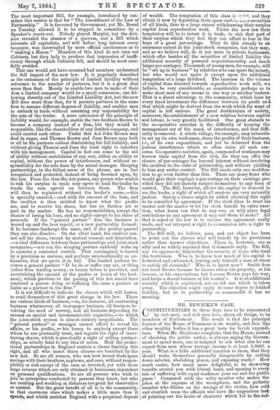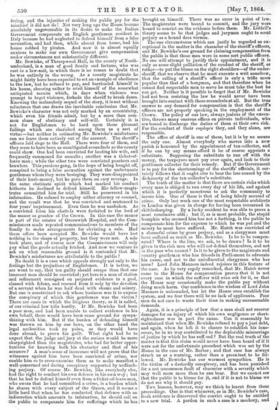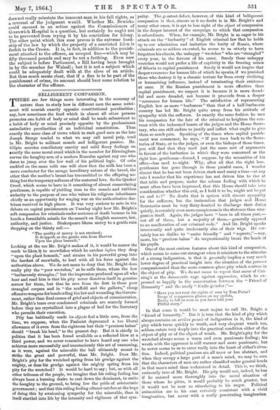MR. BEWICKE'S CASE.
CONSTITUENCIES in these days love to be represented by rich men, and rich men love, above all things, to be members of Parliament. The result is that the principal feature of the House of Commons is its wealth, and that like other wealthy bodies it has a great taste for lavish expendi- ture. When Mr. Gladstone complains that the House, instead of checking the public outlay, is always urging the Govern- ment to spend more, one is tempted to ask what else he can expect from men whose average income is at least 5,000/. a year. What is a little additional taxation to them, that they should make themselves generally disagreeable by cutting down salaries, abolishing places, and exposing waste ? How much easier, how much more delightful, to be showering benefits around you with liberal hand, and opening to every tale of suffering with equal readiness your ear and the public purse Compared with the witty member who makes the jokes at the expense of the wrongdoers and the pathetic member who dilates on the wrongs of the victim, how cold and churlish seem the officials who have the ungracious took of pointing out the faults of character which led to the sof- fering, and the injustice of making the public pay for the mischief it did not do ! Not very long ago the House became absolutely ungovernable in its desire to make the Italian 'Government compensate an English gentleman resident in Italy because he had neglected to defend himself from a false accusation, and had then, while absent from home, had his house robbed by pirates. And now it is almost equally anxious to make our own Government give compensation under circumstances not substantially different. Mr. Bewicke, of Threepwood Hall, in the county of North- umberland, is a man of good family and fortune, who was cast in a law-suit, in which there is no reason to doubt that he was entirely in the wrong. As a county magistrate he might fairly have been expected to set an example of obedience to the law, but he refused to pay, and barricaded himself in his house, choosing rather to avail himself of the somewhat antiquated maxim which, in days when violence was prompt to beget violence, forbade the sheriff to break doors. Knowing the melancholy sequel of the story, it is not without reluctance that one draws the inevitable conclusion that Mr.
Bewicke's character was not only marked by an eccentricity, which even his friends admit, but by a more than com- mon share of obstinacy and self-will. Certainly it is not for Englishmen to be hard upon those pleasant failings which are cherished among them as a sort of virtue—but neither in estimating Mr. Bewicke's misfortunes can we leave them entirely out of the account. The sheriff's officers laid siege to the Hall. There were four of them, and they seem to have been as unmitigated scoundrels as the county could show. One had been convicted for beating his wife, and frequently summoned for assaults ; another was a ticket-of- leave man ; while the other two were convicted poachers and brawlers. This precious gang, in the hope of being bought off, conspired to bring a false accusation against the unfortunate gentleman whom they were besieging. They were disappointed of their hush-money, but he gave them an easy revenge. In the same obstinate spirit which had marked his conduct hitherto he declined to defend himself. His fellow-magis- trates committed him for trial. Still he persevered in his infatuation. He refused to employ either attorney or counsel, and the result was that he was convicted and sentenced to four years' imprisonment. Even then he was unshaken. As a convicted felon his chattels were forfeited to the lord of the manor as grantee of the Crown. In this case the manor is part of the estates of Greenwich Hospital, and the Com- missioners made repeated communications to members of the family to make arrangements for obviating a sale. Had these offers been accepted Mr. Be wicke would have lost nothing in the shape of property, but they were not. A sale took place, and of course now the Commissioners will only pay what the goods actually fetched. And now we venture to ask on what reasonable ground is it contended that Mr. Bewieke's misfortunes are attributable to the public ?
No doubt it is a case which appeals strongly not only to the feelings but the prejudicea of Englishmen. It is better, we are wont to say, that ten guilty should escape than that one innocent man should be convicted ; yet here is a man of station and refinement consigned on perjured evidence to a gaol, classed with felons, and rescued from it only by the devotion of a servant when he was half dead with shame and misery. But one is constrained to ask whose business was it to -expose the conspiracy of which this gentleman was the victim ? There are cases in which the litigious theory, as it is called, of our criminal law tells hardly. If Mr. Bewicke had been a poor man, and had been unable to collect evidence in his own behalf, there would have been some ground for sympa- thizing with him. But if the burden of defending himself was thrown on him by our laws, on the other hand the legal authorities took no pains, as they would have done abroad, to prove his guilt. What right had he to expect that the judge and jury at the assizes would be more sharpsighted than the magistrates, who had far better oppor- tunities for knowing both his character and that of his accusers ? A. man's sense of innocence will not prove that the witnesses against him have been convicted of crime, nor enable him so to cross-examine them as to make manifest a well-concerned and daring conspiracy supported by unflinch- ing perjury. Of course Mr. Bewicke, like everybody else, had the right to conduct his own defence in his own way; but that he had to defend himself even from a ticket-of-leave man, who swore that he had committed a crime, is a burden which he shares with every subject of the Queen, and it seems a little hard that when lie has conducted that defence with an indiscretion which amounts to infatuation, he should call on --the public to compensate him for sufferings which he has brought on himself. There was no error in point of law. The magistrates were bound to commit, and the jury were bound to convict on the evidence before them. Mr. Liddell's theory seems to be that judges and jurymen ought to scent perjury as a hound does vermin. The one circumstance which can justly be regarded as ex- ceptional in the matter is the character of the sheriff's officers, and Mr. Bewicke's one ground for claiming compensation from the public is that these men were in some sort public officers. No one will attempt to justify their appointment, and it is only as some slight palliation of the conduct of the sheriff, or rather—to put the blame on the right shoulders—of the under- sheriff, that we observe that he must execute a writ somehow, that the calling of a sheriff's officer is only a trifle more popular than that of a hangman, and that therefore when he cannot find respectable men to serve he must take the best he can get. Neither is it possible to forget that if Mr. Bewicke had not been resisting the law he would never have been brought into contact with these scoundrels at all. But the true answer to any demand for compensation is that the sheriff's officers are not properly speaking in the employment of the Crown. The policy of our law, always jealous of the execu- tive, throws many onerous offices on private individuals, who are bound to discharge the duties of them at their !awn risk. For the conduct of their employes they, and they alone, are responsible.
The office of sheriff is one of these, but it is by no means the only one. Almost everybody who moves into a new parish is honoured by the appointment of tax-collector, and if he can by any means afford it he of course appoints a substitute. Supposing the substitute to run off with the money, the taxpayers must pay over again, and look to their gentleman collector for their remedy. But if the Government is to pay for the shortcomings of the sheriffs' officials, it cer- tainly follows that it ought also to bear the loss caused by the dishonesty of the tax-collector's substitute. The truth of the matter is that there are certain risks which every man is obliged to run every day of his life, and against which it is perfectly monstrous to ask the community to insure him. One of these is that of being falsely accused of crime. Only last week one of the most respectable architects in London was given in charge for having been concerned in skittlesharping. By a lucky accident he was able to prove a most conclusive alibi; but if, as is most probable, the stupid bumpkin who accused him has not a farthing, is the public to compensate him for the expense to which he was put and the misery he must have suffered. Mr. Hatch was convicted of a shameful crime by gross perjury, and as a clergyman must have suffered as much as Mr. Bewicke. Is he to be compen- sated? Where is the line, we ask, to be drawn ? Is it to be given to the rich men who will not defend themselves, and not to the poor who cannot ? Is it to be given to the magistrate and country gentleman who has friends in Parliament to advocate his cause, and not to the uninfluential clergyman who has hone ? Lord John Manners indeed rejoices in this feature of the case. As he very sagely remarked, that Mr. Hatch never came to the House for compensation proves that it is not every case in which the sufferer will even ask for it, so that the House may occasionally make the public pay without doing much harm. Our confidence in the wisdom of Lord John Manners is unbounded, but let the House once establish the system, and we fear there will be no lack of applicants. Poor men do not care to waste their time in making unreasonable demands.
Again, it is a principle of law that a man shall not recover damages for an injury of which his own negligence or short- sightedness was in part the cause. Can it reasonably be maintained that when Mr. Bewicke refused to pay a just debt, and again, when he left it to chance to establish his inno- cence, he in no way contributed to the deplorable miscarriage of justice by which be has suffered? But the real truth of the matter is that this claim would never have been heard of if it were not for the unfortunate precedent which was set by the House in the case of Mr. Barber; and that case has always struck us as a warning, rather than a precedent to be fol- lowed. Mr. Bewicke has our warmest sympathies. He is the victim of a dastardly conspiracy, and has been punished for a not uncommon fault of character with a severity which may well seem more than he can bear. But we cannot see that the public is to blame for it, and if it is not to blame we do not see why it should pay.
Two lessons, however, may we think be learnt from these proceedings. One is that whenever, as in Mr. Bewicke's case, fresh evidence is discovered the convict ought to be entitled to a new trial. A pardon in such a case is a mockery, and does not really reinstate the innocent man in his full rights, as a reversal of the judgment would. Whether Mr. Bewicke could succeed in an action against the Commissioners of Greenwich Hospital is a question, but certainly he ought not to be prevented from trying it by his conviction for felony. The other point which this ease proves is the extreme hard- ship of the law by which the property of a convicted felon is forfeit to the Crown. It is, in fact, in addition to the punish- ment attached to the offence, an unequal fine—which may be fifty thousand pounds and may be not a farthing. Even now the subject is before Parliament, a Bill having been brought in by the member for Walsall ; but it is not a subject which could be adequately dealt with at the close of an article. But thus much seems clear, that if a fine is to be part of the punishment of crime, its amount should bear some relation to the character of the offence.
































 Previous page
Previous page